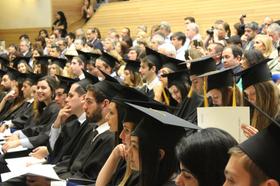Prospective college students that come from families where many have already forged the path through higher education have many resources at their disposal when it comes time to head to the college of their choice. In contrast, those who will be the first in their family to attend college do not have the same advantage of experience within the family to light the way. For those students, programs like Trio Upward Bound help them to understand what higher education is about and find the path through a college education that will benefit them most in the future. To that end, community colleges across the country offer Upward Bound programs to motivate students to explore higher education and determine the college path they want to take.
This video looks at the Harvey Mudd College Upward Bound program.
History of Trio Upward Bound
The origins of Upward Bound date back to the Educational Opportunity Act, which was signed into law by President Lyndon B. Johnson in 1964. According to the Council for Opportunity in Education, the experimental program was first introduced to reduce barriers faced by low-income and first-generation college students that created inequality in educational opportunities for those students. The program is offered through colleges, universities, and community colleges, and funds are distributed to individual programs through the issuance of competitive grants.
Upward Bound is just one of three programs that are currently a part of Trio. Talent Search was created by the Higher Education Act in 1965, and Special Services for Disadvantaged Students followed in 1968. This set of education programs, dubbed “Trio” is primarily used to encourage students to attend college who otherwise might not have the opportunity, and to ensure their success once they begin their college experience.
Currently, Trio programs are offered through more than 1,000 institutions of higher education across the country. There are nearly 3,000 Trio programs currently operating, serving more than 840,000 low-income students in the U.S. The programs serve low-income families, minority students, veterans and students with disabilities.
Benefits of the Program
Trio Upward Bound offers many advantages to students who might not otherwise attend or complete a college degree program. Eastern Gateway Community College states on its website that students who participate in an Upward Bound program are four times more likely to earn a college degree than their peers. The program works by demonstrating to participants the importance of a college education and providing the necessary tools to help students choose a degree program that fits well with their interests and needs.
“So many students entering college experience a complete culture shock,” Karolyn Chowning, Grant Programs Director at Oklahoma City Community College, told News OK. “It’s even more so for those going in belonging to a different socio-economic group.”
Chowning explained that students who had family members attend a college or university first had the advantage of firsthand knowledge and advice about the school. For those who don’t have such an advantage, Chowning told News OK, “I like to think that Trio can step in and serve as a family; helping to guide you.”
This video reports on the Upward Bound program at Clatsop Community College.
What is Included in the Upward Bound Program?
Grand Rapids Community College describes numerous components of the Upward Bound program on its website, including:
- Regular meetings with Upward Bound staff during the school year, through home visits, classes, tutoring, and enrichment activities
- Academic and career advising to help students succeed in classes and choose fields of study that fit their interests and needs
- Campus visits to give students a firsthand look at what college life is like and conferences and workshops specifically geared to preparing them for college success
- Summer programs that emphasize a combination of academic, social, and enrichment activities during a six-week stint on a local college campus
While these components may vary slightly depending on the college offering the program, the core elements are relatively consistent. At the crux of the program is the desire to prepare qualified students for a successful college experience, when they may not receive that encouragement and guidance from any other source.
Who is Eligible for Upward Bound?
Benefits.gov lists the criteria for eligibility into an Upward Bound program, which includes:
- Students must be between the ages of 13 and 19 and have completed the 8th grade
- Students must be able to show evidence of the need for academic support
- Students must qualify for low-income status or be first-generation college students
- Students must be recommended for the program by an educator, clergy or social worker
Students that meet the above qualifications are allowed to apply for the program, through their high school guidance counselor.
In some cases, colleges offering the program may have additional requirements for students. For example, Barton Community College states that to be eligible for their Upward Bound program, students must attend one of the high schools listed on the college’s website. The college also states that it does not accept students who are currently in the 12th grade.
This video explores the eligibility requirements for the Upward Bound program.
New Upward Bound Grant Awarded to Oklahoma City Community College
The federal government continues to provide funding for Upward Bound programs through a competitive system that awards money to specific institutions. News OK recently reported that one of the latest recipients of such a grant is Oklahoma City Community College, which will receive more than $310,000 each year over the next five years to continue its successful Upward Bound program. The program serves students in 9th through 12th grade who go to school in the Oklahoma City area, through year-round activities and classes. Students attending the program are required to take tutoring and college prep classes throughout the school year and can attend Upward Bound Summer Academy during summer vacation.
If you qualify for the Upward Bound program, take advantage of its benefits, which can serve you well through college and your entire professional life!
Questions? Contact us on Facebook @communitycollegereview















